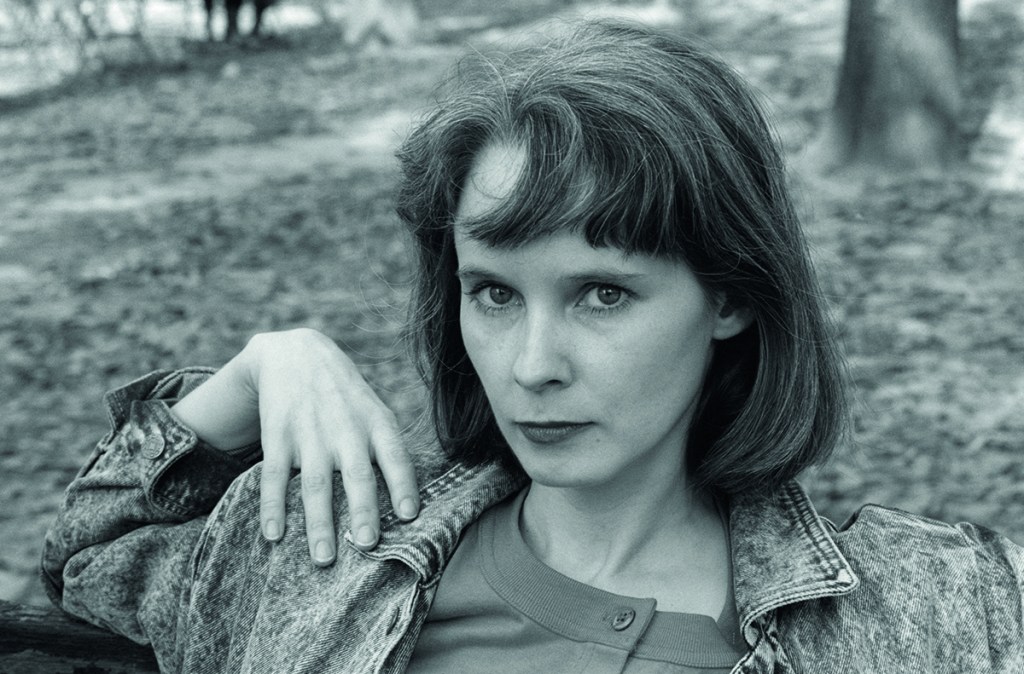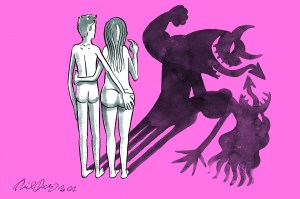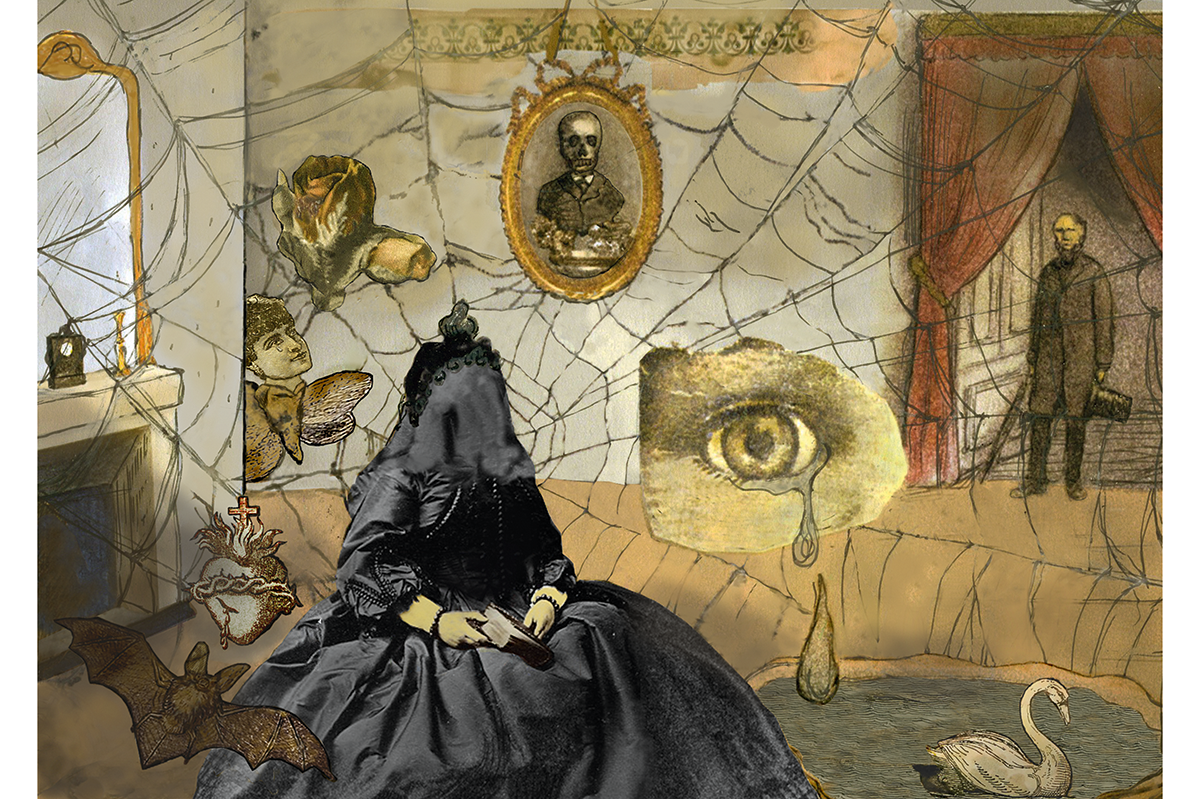In the early 1990s, the American novelist Mary Gaitskill suffered an abrupt awakening. ‘I lived in New York, I didn’t have a television, I didn’t listen to the radio. I didn’t even read magazines or newspapers very often. I was really too preoccupied with my own existence, which was hand to mouth a lot of the time,’ she says. ‘But when I was a little better off, I began to pay attention. I did get a TV. I did listen to the news a lot. And I was just like, holy shit. What a weird
fucking world.’
What particularly astonished her, she says, is how central the fashion industry had become: ‘Models had always been glamorous figures, but suddenly they were the most important thing any woman could possibly aspire to be. They were just the most important female figures in the world. And it was kind of ridiculous.’
The culture was telling her that the world could be sorted into a shifting set of aspirational categories: ‘we’ were like this, and then ‘we’ were like that. In an essay prefacing her novel Veronica, which is set in the fashion world, Gaitskill calls this ‘the seed of deprivation hidden in a fever-dream of perfection’. It’s characteristic that Gaitskill responded with a fierce sense not only of how ridiculous those images were — but also how seductive.
I met her over Zoom a little over a week ago to talk about the republication of her book-length essay Lost Cat. To those familiar with Gaitskill’s work it may seem to cover unexpected terrain. The story collection that made her name, Bad Behavior, drew in part on her own experiences as a teenage runaway and sometime stripper, and was set in a Manhattan demimonde of bad sex and marginal lives, drug addiction and emotional trauma. ‘The Secretary’, a superbly unsettling story about not-quite-consensual sadomasochism, was given what Gaitskill called the Pretty Woman treatment when it was filmed with James Spader and Maggie Gyllenhaal.
Gaitskill attracts the epithet ‘transgressive fiction’, but she doesn’t really understand why people call her work dark. ‘It could be because I’m so dark I don’t even see it,’ she says, deadpan. ‘I mean, I have written things that were rather dark — things that I would call that. But overall, no. I think people confuse sadness with darkness.’
Lost Cat, certainly, is a book about sadness — Gaitskill’s grief when a stray cat, adopted while she was at a writers’ retreat in Italy, went missing shortly after her return to the States. But it’s a book that uses the story of the cat to explore other losses, other griefs: her relationship with her father, her relationships with her sisters and, centrally, the writer’s love for a pair of deprived inner city kids whom she and her then husband, who have no children of their own, semi-fostered over several summers, only to watch them drift away.
She’s scornful in the book of the idea that it’s sentimental or silly to be so unmanned (or unwomanned) by the loss of an animal. Of her father’s grief when his dog died within a year of both his parents dying, she writes: ‘His parents meant so much to him, he could not afford to feel their loss. The dog he could feel, and through the door of that feeling came everything else.’
Talking about it now, she says: ‘Family lore was that he didn’t cry when his parents died, his mother told him to be a brave boy. And so he was. Then his father died later. And he was still a brave boy. But the dog got hit by a car and he just went to pieces. And people thought that was strange. And it makes perfect sense to me.’
The cat himself, whom she came to call Gattino, was a one-eyed scrap of a moggy: ‘He was a tabby, soft gray with strong black stripes. He had a long jaw and a big nose shaped like an eraser you’d stick on the end of a pencil. His big-nosed head was goblinish on his emaciated pot-bellied body, his long legs almost grotesque. His asshole seemed disproportionately big on his starved rear.’
Lost Cat is very far from cutesy, then. And Gaitskill, though at 66 she could be taken for a spry Midwestern grandmother, is very far from cutesy herself. She’s precise and serious. She’s too well-mannered to say as much when you’ve asked a stupid question, but she doesn’t go out of her way to pretend you haven’t. And there’s that quality in her writing: it is marked by a sort of pitiless noticing, an absolute fidelity to the particularity of what’s there.
One of the strangest aspects of Lost Cat is that in the course of her bewilderingly obsessive search for Gattino, Gaitskill consults a number of psychics. This clear-eyed writer doesn’t seem an obvious mark for Madame Sosostris, but Gaitskill says it wasn’t the first time she’s had such consultations. ‘Even in the moment I found it a little pathetic and weird that I would be doing that with an animal — but I actually believe some people are psychic. I probably shouldn’t say that in public. It’s probably the most embarrassing thing I’ve ever said in public. And I’ve said some embarrassing things.’
Gaitskill’s fiction is populated by characters who don’t always completely understand their own desires; who seek love, or fight against loneliness, in ways that turn out to harm themselves and others. Her work asks the reader to inhabit their worlds. In our age of drastic oversimplification in sexual politics and public morality, Gaitskill’s work says over and over again: it’s more complicated than that.
Her story This Is Pleasure, published in the summer of last year while #MeToo was still central in the public conversation, is a case in point. It centers on the intimate but not sexual friendship between Margot and her longtime friend Quin, as Quin finds himself canceled over reports of ‘inappropriate behavior’. Quin’s behavior with women is unacceptable — but he’s not a predator or an abuser in a straightforward way. Anyone looking for a moral here will come away baffled.
The story is a perfect hall of mirrors. It was inspired by a male friend of Gaitskill’s who was canceled. His stock-in-trade, like Quin’s, was ‘paying women the kind of attention people crave… seducing people into revealing things about themselves’:
‘He would pull people into these things. And I think at first they did enjoy it. And then they felt humiliated and weird. And then he started to make fun of them for it afterwards…I loved him. I don’t mean romantically, but just as a person, but I could see how he was behaving. I can see why he got into trouble. But what I did not understand was when then there was a petition put out, threatening to boycott anybody that would hire him. And that just strikes me as really an overreach — like a grotesque overreach.
‘I was drawn to [#MeToo] because it was a situation I was confused about. If I had a clearer feeling about #MeToo, pro or con, I probably would have written an essay… But I wasn’t so sure. I mean, I could look at it sometimes and think, well, yeah, it’s a good thing that these assholes are getting their pants pulled down in public, but I don’t think it’s a good thing that they’re now barred from ever working again. I mean, if it’s suddenly illegal to be an asshole, we’re all in trouble.’
She writes in Lost Cat: ‘Human love is grossly flawed, and even when it isn’t, people routinely misunderstand it, reject it, use it or manipulate it. It is hard to protect a person you love from pain, because people often choose pain; I am a person who often chooses pain. An animal will never choose pain; an animal can receive love far more easily than even a very young human.’
Gaitskill took an epigraph from Auden for Bad Behavior, and she’s as attentive as any writer I can think of to another observation of Auden’s: that the desires of the heart are as ‘crooked as corkscrews’. In Lost Cat, Caesar, the adolescent boy she has fostered, asks whether he and his sister could live with Gaitskill permanently.
‘It wasn’t possible,’ Gaitskill says. ‘And I think it would have been really difficult for them. One of the reasons is that he was used to being physically disciplined.’ She told him: ‘I think you’d miss your Mom. I think you’d miss your neighborhood. And we wouldn’t hit you when you acted out; I think you
would miss that.’
‘And he said, “Why do you think that is?” I said, “I don’t know, really” — because I don’t. I think I remember saying: “If you can answer that question one day, you can make a million dollars.”’
This article was originally published in The Spectator’s December 2020 US edition.

























